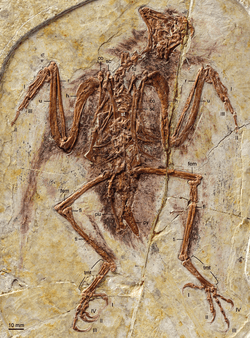Bohaiornithidae
| Bohaiornithids Temporal range: Early Cretaceous, 125–120 Ma | |
|---|---|
 | |
| Fossil specimen of Zhouornis hani | |
| Scientific classification | |
| Kingdom: | Animalia |
| Phylum: | Chordata |
| Class: | Reptilia |
| Clade: | Dinosauria |
| Order: | Saurischia |
| Suborder: | Theropoda |
| Clade: | †Enantiornithes |
| Family: | †Bohaiornithidae Zhang et al., 2014 |
| Type species | |
| †Bohaiornis guoi Hu et al., 2011 | |
| Genera | |
| |
Bohaiornithidae is a group of early predatory enantiornitheans from the early Cretaceous Period of China. All known specimens come from the Jiufotang Formation and Yixian Formation, dating to the early Aptian age, 125-120 million years ago.[1]
Bohaiornithidae was first coined as a family of enantiornithean birds by Wang and colleagues in 2014. They defined it as the natural group formed by all descendants of the common ancestor of the type species, Bohaiornis guoi, and Shenqiornis mengi.[1]
The cladogram below was found in the phylogenetic analysis of Wang et al. 2014, which itself was an updated version of O’Connor et al. 2013.[2] The cladogram is based on a data matrix that includes 56 avialan taxa, scored based on 262 morphological traits.[1]
| Enantiornithes |
| |||||||||||||||||||||||||||||||||||||||||||||||||||||||||||||||||||||||||||||||||||||||||||||||||||||||||||||||||||||||||||||||||
| |
References
- 1 2 3 Wang M., Zhou Z.-H., O’Connor, J.K., and Zelenkov, N.V. (2014) A new diverse enantiornithine family (Bohaiornithidae fam. nov.) from the Lower Cretaceous of China with information from two new species. Vertebrata PalAsiatica, 52(1): 31-76.
- ↑ O’Connor, J.K. Zhang, Y. Chiappe, L.M. Meng, Q. Quanguo, L. & Di, L. (2013) A new enantiornithine from the Yixian Formation with the first recognized avian enamel specialization. Journal of Vertebrate Paleontology 33(1):1-12.